'Finally, a life': Canada comes to the rescue when a refugee family loses hope in Australia
Dima, Hani and their son escaped the hopelessness of detention through sponsorship that led to permanent residency, in Toronto
Helen Davidson @heldavidson Fri 7 Feb 2020
Palestinian refugees Dima (right) and Hani, formerly detained on Nauru,
with toddler Mohammed flying to Canada from Australia.
Dima first appeared in the headlines three years ago. Back then, she was a 37-year-old anonymous refugee on Nauru with a potentially life-threatening pregnancy, being refused a critically needed transfer to Australia. When the Australian government finally agreed, Nauru’s ministry refused to let her go.
Eventually, at 38 weeks pregnant, suffering suspected pre-eclampsia and with her baby in breech, Dima was flown to Cairns. Her husband, Hani, was left behind.
It took almost two years before she and her family were reunited – across the country in Adelaide, in the limbo of community detention.
Speaking to Guardian Australia in Canadian mid-winter, in a new home near her child’s daycare, that all seems very far away.
Dima first appeared in the headlines three years ago. Back then, she was a 37-year-old anonymous refugee on Nauru with a potentially life-threatening pregnancy, being refused a critically needed transfer to Australia. When the Australian government finally agreed, Nauru’s ministry refused to let her go.
Eventually, at 38 weeks pregnant, suffering suspected pre-eclampsia and with her baby in breech, Dima was flown to Cairns. Her husband, Hani, was left behind.
It took almost two years before she and her family were reunited – across the country in Adelaide, in the limbo of community detention.
Speaking to Guardian Australia in Canadian mid-winter, in a new home near her child’s daycare, that all seems very far away.
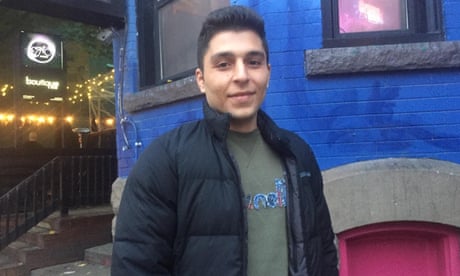
'I can't believe I'm free': the Canadian citizens ending the torment for Australia’s offshore refugees Read more
“In Australia you’re free but you don’t have choices,” she says.
“Work, study, where I live – these choices are essential for a human being.”
The family are now permanent residents in Canada, welcomed under a Canadian government sponsorship system which is increasingly becoming the final life raft for the refugees left in the limbo of Australia’s infamous offshore processing system.
Under the internationally condemned regime, anyone attempting to seek asylum in Australia by boat after mid-2013 was sent to Nauru or Manus Island in Papua New Guinea. The two centres detained thousands in conditions that included abuse, neglect, illness, riots and death. Hundreds have been brought to Australia for medical care but their future remains the same: empty of any promise except that they’ll never settle in Australia.
So they had to find other ways out.
‘We are really here’
Dima was born in Kuwait and, as a stateless Palestinian refugee, never given citizenship. She and Hani – also a stateless Palestinian refugee – met in Iraq and fled together.
The couple left their Baghdad home and travelled a well-worn path to Australia. They landed in Nauru, still together, until the Australian government said Dima had to give birth alone.
Years later, in Adelaide, the family left their Australian home for the last time, before dawn. Dima, Hani and their toddler Mohammed flew to Sydney for a connecting flight to Vancouver, where the paperwork took so long they missed their flight to Toronto. Eventually they got there.
“We were really tired, but we were excited – like, wow, fuck we are really here!” Dima laughs.
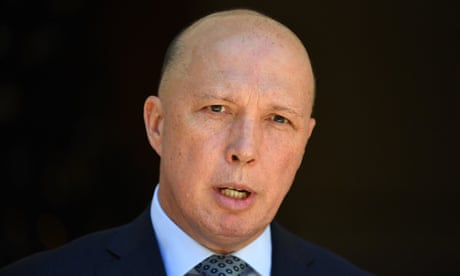
Home affairs department racked up $6.1m bill transferring refugees and asylum seekers
Read more
“Our sponsors were in the airport and said, ‘Finally!’ Because it was a really long process.
“We were excited that finally we were getting our freedom, and normal limitations, with no one controlling our lives. We can be what we want to be. Mohammed can be what he wants to be. He can be free, he can have a life.”
It was autumn in Toronto when the family arrived but it was gearing up to be a harsh winter. Ravi de Costa, an Australian living in Canada and one of the family’s sponsors, recalls Mohammed coming to visit wearing snow pants and five separate layers.
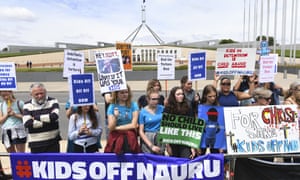
t The family joined 62 others in lodging a complaint against the Australian government with the UN for arbitrary and indefinite separation.
Photograph: Lukas Coch/AAP
‘Aussie mum’
Ravi met the family through his mother, Caroline de Costa. Dima calls Caroline their “Aussie mum”.
An obstetrician, Caroline was by Dima’s side soon after she was transferred to Cairns from Nauru.
In late 2017, Caroline and Ravi heard of a young man, Amir, who had been detained in offshore processing and who had made it to Canada via the Canadian government sponsorship system.
They started the paperwork to sponsor the family a few months later, while Hani was still in Nauru.
Dima hadn’t seen him since she was medically evacuated to Cairns, having been told he would follow.
She gave birth via C section. Caroline was there.
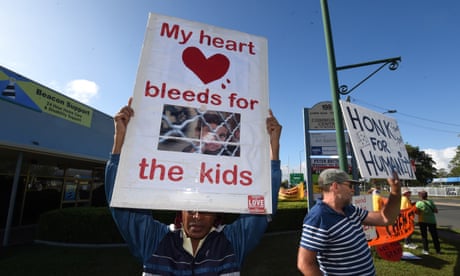
Nauru overrules Australia over decision to transfer sick pregnant refugee
Read more
Ten days later the new mother was moved with her baby to a former convent outside Cairns, until she found accomodation and built a life for a year – protected from being returned to Nauru by the lobbying of lawyers and local advocates. Then, one day in February, the government gave her 72 hours’ notice that she and her baby were being sent to Adelaide.
For 10 months more Dima looked after Mohammed without Hani, whose mental and physical health was deteriorating in Nauru.
The family joined 62 others in lodging a complaint against the Australian government with the United Nations for arbitrary and indefinite separation.
In December Hani was transferred but made to stay in detention until enough pressure was brought on the authorities to let him live with his wife and child.
“It was overwhelming, I was crying, I was really happy for us to be together again as a family, and for Mohammed and Hani to be together as a father and son,” says Dima.
“Because Mohammed is so young, it was sort of effortless. I’m not saying that is for every family, but we were speaking every day so Mohammed knew it was his father. But it was so different because he was living with us now.”
‘Not as easy as it seems’
Their Toronto apartment is in a friendly and multicultural community near services, transport, halal food and Mohammed’s preschool. They are still looking for friends, Dima says, but first they need jobs.
“Moving to a new country is not as easy as it seems. Although we have our freedom, we have to look for jobs, to engage and emerge in the community, and then we can find work.”
Dima wants to study and Hani, a mechanic, wants to get his Canadian qualifications and has started an apprenticeship.
They have time – the Canadian program requires sponsors provide a certain amount of money for each refugee to support them for the first year, while they find their feet.
Ravi and his four co-sponsors (his partner Dilya, Dilya’s sister and two friends) were approved after a full year’s wait, and with fundraising by Caroline, provided C$24,000 ($26,800) for the family.
“The private sponsors have to think about where the family are going to arrive, what services they would need, what kind of supports exist,” he says.
“Once you start looking, in this country and this city in particular, there are so many things. We found free furniture, clothes, healthcare, speech therapy for Mohammed. There are all kinds of things here. So the settlement plan is really about coming up with those kind of things that human beings need – what kind of housing will be realistic, kinds of work, school.”
‘It’s people action’
The sponsorship program was originally designed to bring in Syrian refugees from the civil conflict, but bringing in people from Australia’s ill-designed and internationally condemned system proved more challenging.
“Dima and Hani were in the Australian system with a whole set of pretty challenging legal situations and uncertainties we had to figure out, as well as the sponsorship process,” Ravi says.
“[I got advice from a colleague in law school who] said there’s no way of knowing things like average timelines with Australian detention, [whereas] there were timelines and parameters for people coming from camps in Turkey.
“We don’t know what happened inside the Canadian immigration department and so on, but in the end it happened very effectively.”
Asked how he feels as an Australian expat in Canada, comparing the two countries’ treatment of the family, Ravi says it’s frustrating that the political cultures are so different.
“I don’t want to convey the idea that Canadians are free from racism or anything like that, it’s not, but it’s not a public culture or a political culture where people can be – or there’s a need to be – very aggressive towards marginalised people like refugees,” he says.
“Canada’s situation hasn’t produced a carceral state, an archipelago of camps and offshoring.”
Dima just wants people to help those still in the system, like people helped her even though they didn’t know her.
“If you want to help you can do it. Don’t wait for the government to change its mind because they won’t,” she says.
“It’s people action, not the government, because the government doesn’t listen to people.”
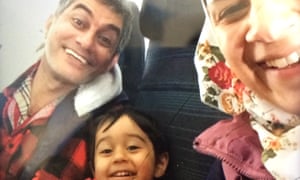
No comments:
Post a Comment